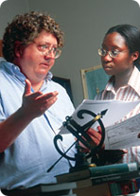Comets are interesting astronomical phenomena today, but centuries ago they were considered harbingers of disaster. Andrew C. Fix, professor and head of history, and several EXCEL Scholar students have been studying documents from the 1600s to learn when and what caused the change in popular thinking about comets.
“We’re looking at comets that came during three dates: 1618-19, 1665, and 1680-82,” Fix says, and examining early French, Dutch, German and English documents. “We’re reading as many sources on comets as we can around those dates to see if the writings change.”
Fix is a historian who specializes in the history of ideas. “I’m particularly interested in the areas when religion, philosophy, and science intersect, and the transition from a traditional religious worldview to a more rational secular worldview in the 17th century,” he says. “This time period is the coming of the Enlightenment worldview, and comets are a window into it.
“My first guess was the change in thinking was the result of the growing understanding of astronomy, particularly after Galileo’s discoveries,” Fix continues. “But none of the writings from that time refer to scientific work to debunk the comet myth. Instead, they make the same arguments that had been made for centuries [nothing dramatic happened when the last comet came].”
Fix’s new hypothesis is that wider attitudes changed about prophecies accurately predicting the future. “The Thirty Years War and the [Cromwell] revolution in England gave rise to many crazy prophecies about the end of the world,” he says, and there was a backlash against prophecy. “This [comet research] is a 10-year project unless we find a ‘smoking gun’.”
Carrie Ryder ’00, a geology graduate who is now a geologist with the geosciences group, URS Corp., Willow Grove, Pa., worked with Fix on this research. She read old German manuscripts looking for documents mentioning comets.
“Andy Fix was one of the most influential professors I had at Lafayette,” says Ryder. “He basically told me what he was looking for and then it was my job to try and find whatever I could that would be relevant to the project. He was always interested in what I had to say and never let me get discouraged. Andy never made me feel like I was the ‘student’ and he was the professor. We always talked like we were collaborators on this really cool project.
“Andy was the main adviser for the Marquis Scholars program, so I got to know him over the course of several trips,” adds Ryder, a former Marquis Scholar. “Andy encouraged and inspired me to challenge myself intellectually beyond what you normally do in the classroom. He was a great friend and mentor during my four years.”

